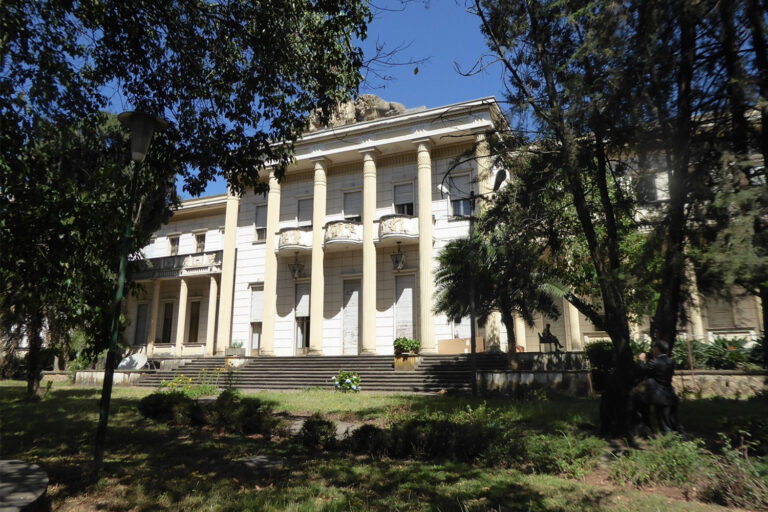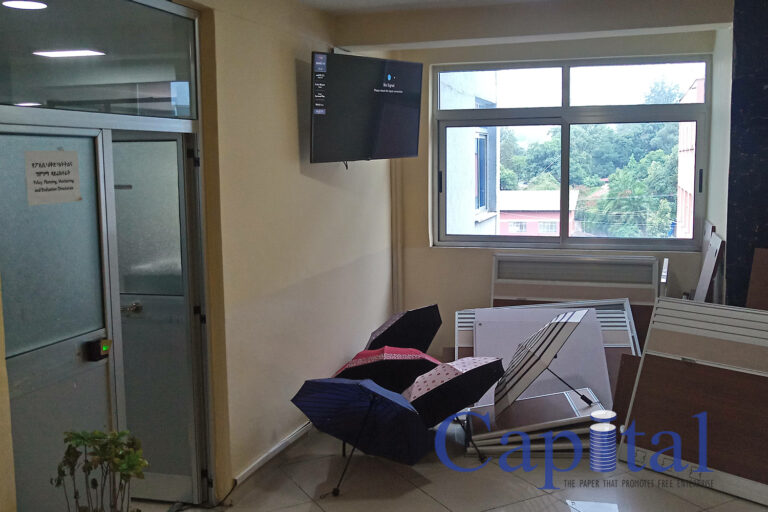A 12 million euros financing has been provided by the French Development Agency (AFD) for the first phase of the renovation project of the National Palace Project, which will be open to the public.
This Project is part of the commitments taken by French Government during the Head of State visit in Addis Ababa in March 2019 in favour of Ethiopian Heritage program. The agreement was signed on July 16, between Ahmed Shide, Minister of Finance, Valérie Tehio, AFD Country Director and Frederic Bontems, Ambassador of France to Ethiopia and the African Union.
The National Palace was built during Emperor Haile Selassie reign and has become one of the most emblematic national buildings of Ethiopia, though it was never opened to the public and was used as an official residency that is currently used as the official quarters of the President.
The first phase of the Project will cost 20 million euros and will consist the opening of the Palace to the public along with the park in front of the Palace. A complementary grant of 8 million euros is expected to be provided by AFD in 2021 after the launch of the works.
Palace Administration will be in charge of the implementation with the support of Expertise France, a French public agency and key actor in international technical cooperation, specialized in designing and implementing technical cooperation projects especially through participation of French public institutions such as Versailles’ Palace organization which will intervene and provide assistance to this project.
In a related news AFD signed an 8 million euro grant agreement on the same day to support the Agricultural Transformation Agency (ATA) to develop agribusiness capacities and access to finance in the agriculture sector. This project is part of the Agriculture Commercialization Cluster (ACC) program, supported by other development partners, such as the Danish and Dutch Embassies and the European Union.
The objective of this financing is to develop the investment capacity of smallholder farmers and the small and medium-sized agribusinesses by providing them with inputs and capacity development services and by upgrading and adding value to the commercial chain of their production.
Within 5 years, it is expected to develop productivity and revenue generation of 1.8 million small farmers and 1,340 agri-SMEs, including them in the value chains from production to marketing, and developing their access to credit and dedicated financial services in order to increase their investment capacity.
AFD provides assistance for the National Palace renovation
Africa will need a lot of energy to power its COVID-19 recovery
Africa will need a lot of energy to build back better in the aftermath of the coronavirus pandemic, Executive Secretary of the Economic Commission for Africa (ECA), Vera Songwe, said.
Speaking during a Res4Africa webinar on scaling up renewable energy investments in Africa, Songwe said actions to ensure there is enough energy to power Africa’s rebuilding efforts should focus on three key aspects – infrastructure, supply and cost of energy.
She said following the outbreak of the COVID-19 pandemic, trade, education and health had moved to ICT platforms, consuming about 40 percent of the continent’s energy.
“So for us to be able to have on the continent a viable ICT sector that will allow our economies to build back better, we are going to need a lot of energy,” said Songwe, adding private investments will play a crucial role, especially with the launch of the Africa Continental Free Trade Area (AfCFTA).
The ECA Executive Secretary said the issue of the continent’s energy was not transition but energy substitution.
“We do not have the transition problem in the kind of scale that Europe has. The conversation for Africa is around substituting expensive bad fossil fuels into something that is cleaner and most certainly cheaper. We have to replace fuel-based energies with green and sustainable ones,” Songwe said.
She added partnerships and cooperation were needed in supporting African countries to deliver on their energy and development agenda.
“We need to begin to honestly and seriously look at the financing structures of Africa’s infrastructure. We are financing infrastructure at shorter time frames than it takes to build that infrastructure resulting in debt sustainability issues,” said Songwe to private sector representatives attending the webinar.
She said Africa’s power utilities need to up their game if they are to play a crucial role in helping the continent build back better post COVID-19.
Only two countries in Africa, Uganda and Seychelles, have viable electricity sectors, said Songwe, a situation she said needs to be addressed with only 19 nations operating at expenditure while the rest are operating at excessive losses.
Cost reflective tariffs are part of the problem affecting the continent’s power sector, she said, adding; “We must ensure that on the continent tariffs are cost reflective.”
Songwe said the continent needs to collectively work together to ensure regional power pools are viable.
“Not every African country can produce energy,” she said, adding with the game-changing AfCFTA, the private sector can invest in the regional power pools to the continent’s benefit. Songwe said local currency energy investments would go a long way in boosting access to affordable energy on the continent.
For his part, Francesco La Camera, Director General of the International Renewable Energy Agency (IRENA), said Africa’s energy decisions are pivotal to climate mitigation and socio-economic development. He reinforced the centrality of the energy transition to post COVID-19 recovery and the 2030 Agenda for Sustainable Development and Africa’s long-term prosperity.
“The need to electrify cities in a sustainable way must be the core of government strategies,” he said, adding there was an urgent need to ensure “the ruling class addresses the perception of risks that investors still have in some parts of Africa”.
Stefano Signore, Head of Unit for Sustainable Energy and Climate Change, Directorate-General for International Cooperation and Development in the European Commission, said; “There is a calling and need to work with Africa and for Africa. We are confident that Europe and Africa can work together to meet the climate agenda, undertake a clean energy transition and forward Africa’s renewable energy development.”
For his part, Amith Singh, Head of Energy Finance at Nedbank in South Africa, said; “If we really want to see Africa’s renewable power being developed, we need global initiatives that can leverage cooperation and investment.”
He said Europe can mitigate risks in African countries with sustainable programmes that can encourage the development of new policies, capacity building, local manufacturing and provide financial assistance.
Roberto Vigotti, Res4Africa Foundation’s Secretary General, said placing renewable energy at the heart of Africa’s COVID-19 recovery is crucial to bridging the energy access gap on the continent.
RES4Africa Foundation and Enel Foundation’s joint 3rd flagship publication Scaling up Africa’s renewable power which is dedicated to de-risking renewable energy investments in Africa, was unveiled during the webinar.
Vigotti said the publication will shed some light on the importance of effective de-risking initiatives to unlock Africa’s renewable energy potential and calls for a new impetus on possible solutions to crowd-in renewable energy investments at scale.
WHO urges greater COVID-19 health services in Africa’s humanitarian settings
The World Health Organization (WHO) called for greater access to COVID-19 detection, testing and care among vulnerable populations grappling with the impacts of protracted conflict and humanitarian emergencies across Africa.
Sub-Saharan Africa is home to over 26% of the world’s refugees. Long-running conflicts in regions like the Sahel have led to the closure of health facilities and the flight of health workers. In Burkina Faso, 110 health facilities have been closed due to insecurity while services have been impaired in 186 others, leaving around 1.5 million people without adequate health care. In Mali’s central and northern regions, health services have been paralysed by persistent attacks. In 2019 alone, 18 attacks on health facilities were reported. So far this year, one health centre has been attacked.
“COVID-19 has exacerbated existing humanitarian challenges, particularly with regards to access to health services in many countries in the region,” said Dr Matshidiso Moeti, WHO Regional Director for Africa. “With the pandemic we have seen some humanitarian operations delayed due to lockdowns, curfews and the restrictions of movement for both personnel and cargo vital for COVID-19 response.”
Crowded settings such as displacement camps can heighten the risk of COVID-19 transmission due to difficult access to clean water, leading to inadequate hygiene, and where physical distancing is almost impossible.
The United Nations system has activated health clusters in eight countries where the humanitarian situation requires support from the international community, including Burkina Faso, Central African Republic, Chad, Democratic Republic of the Congo, Ethiopia, Mali, Niger and South Sudan. Although information on COVID-19 transmission in humanitarian settings remains limited so far, about 1800 COVID-19 cases have been reported in seven of these countries among the displaced, refugees, migrants or in areas affected by humanitarian crises. Due to the limited detection and testing capacity, the number is likely to be an under-estimate.
“WHO urges the humanitarian community and Member States to increase support to the millions of people in dire need of assistance in the region. If we don’t step up health services, including testing, tracing, isolation and care for people already living in precarious settings and displacement camps, COVID-19 could spark untold tragedy,” said Dr Moeti.
WHO has developed guidance on adapting COVID-19 mitigation in camp or camp-like settings, recommending health screenings for people arriving at collective sites and temporary isolation centres for suspected cases. WHO advises that activities like food distribution or education be adjusted to limit mass gatherings and strengthen infection prevention and control.
WHO is working with the United Nations Office for the Coordination of Humanitarian Affairs, the UN Refugee Agency (UNHCR) and other operational partners to raise awareness about COVID-19 among vulnerable populations, distribute medical supplies and implement preventive measures such as handwashing stations. Efforts are also underway to strengthen surveillance, train health workers, establish telehealth centres, and test and care for people who contract the disease.
The United Nations is implementing the Global Humanitarian Response Plan for COVID-19 to fight the pandemic in countries facing humanitarian situations. The plan identifies ways to address the immediate health and non-health needs related to COVID-19 for the most vulnerable populations through health, water, sanitation, hygiene, food and agriculture, logistics, education and protection. Of the 63 countries covered by the plan, 20 are in Africa.






